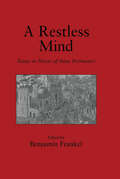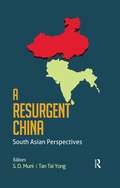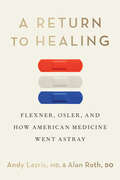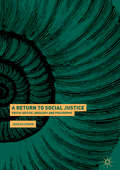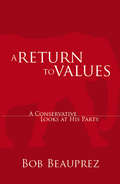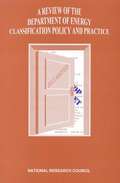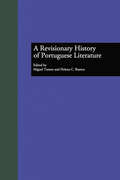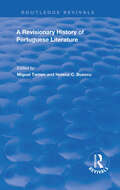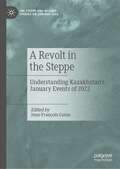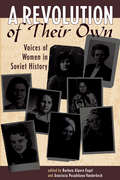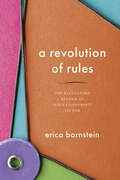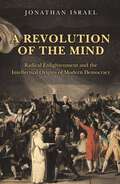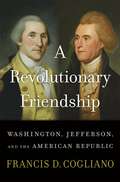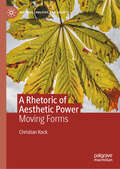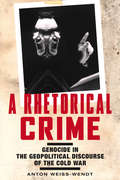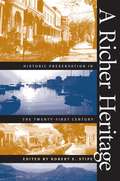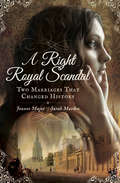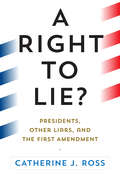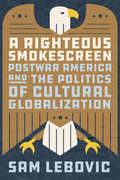- Table View
- List View
A Restless Mind: Essays in Honor of Amos Perlmutter
by Benjamin FrankelAmos Perlmutter has devoted his academic career to the study of comparative politics, international relations and modern authoritarianism. He has written 14 books and more than 70 articles in academic journals. He has also been a prolific contributor to newspapers in the United States and abroad and offered commentary on TV and radio shows. These essays analyse and explain some of his thinking.
A Resurgent China: South Asian Perspectives
by Tan Tai Yong S. D. MuniBringing together a range of South Asian perspectives on rising China in a comparative framework, an attempt has been made, for the first time, to identify and examine the political, economic and socio-cultural stakeholders and constituencies that influence the respective policy of individual South Asian countries towards China. The essays also project how their mutual relations are likely to be shaped by these. The book is especially relevant today owing to China’s growing weight in Asian and global affairs.
A Return to Common Sense: How to Fix America Before We Really Blow It
by Leigh McGowanA political book for non-political people from viral TikTok sensation PoliticsGirl. Something&’s gone wrong in the Land of the Free and the Home of the Brave. We can all feel it, but if we&’re being honest, most of us don&’t understand it. At the end of the day, we don&’t have all the facts, and if you don&’t know how something works, how do you fix it? A Return to Common Sense is a concise, no-nonsense, dare we say fun, guide to how America works and a roadmap to reclaiming a government of, by, and for the people. If we truly want to be a land of freedom and opportunity where everyone has a shot at a good life, we must acknowledge the ideals of America are in danger, but worth saving. We fought a revolutionary war for the idea of self-governance and pursuit of happiness—we can&’t just give up on it now. To address the crisis, Leigh McGowan offers Six American Principles. Six ideals, rooted in history, that we can all agree make America, America. 1. America is a land of freedom. 2. Everyone should have the opportunity to rise. 3. Every citizen should have a vote, and that vote should count. 4. Representatives should represent the people who elected them. 5. The law applies to all of us. 6. Government should be a force for good. Using the Six Principles as guideposts, this book will lay out suggestions for America, to not only find its way out of the mess it&’s currently in, but to set a course for a future of which we can all be truly proud. It&’s time to find the courage to step out of our comfort zones and off our team benches to reboot America. If we start here, we start strong. We can fix this, but the way forward starts with understanding.
A Return to Healing: Flexner, Osler, and How American Medicine Went Astray
by Andy Lazris Alan RothDrawing from their extensive experience in primary care and backed by decades of academic research, primary care physicians Andy Lazris, MD, and Alan Roth, DO, unravel the complexities of the modern health care system in A Return to Healing. Through a wealth of patient stories and meticulous research, they dig into the roots of American health care challenges and seek its cure. Utilizing poignant patient narratives and rigorous analysis, Lazris and Roth expose the flaws in our modern approach to health care. The book dissects the current philosophy of medical care, addressing foundational issues in health care infrastructure, the pitfalls of screening, the dishonesty of the pharmaceutical industry, and a lack of common sense among health care providers. By exploring common diseases and medical scenarios, demonstrating how doctors arrive at their conclusions, and focusing on the perverse incentives and outdated training that drive doctors to rely on protocols and numerical-based care, Lazris and Roth demonstrate what is wrong with the system and reveal how to fix it. Advocating for patient empowerment, the book offers a road map for reform that is accessible to patients and policymakers alike. This solution-oriented approach aims to dismantle barriers to patient-centred care and foster informed decision-making. In this compelling critique and call to action, A Return to Healing provides a clear path towards a more equitable and effective health care system.
A Return to Social Justice: Youth Justice, Ideology And Philosophy
by Jessica UrwinYouth justice has always focused on criminal justice but this work argues that taking a social justice approach is the best way to reduce youth crime. Drawing on philosophy, new research, and practitioners’ views, a new organizational structure and approach is developed. Urwin outlines the philosophical and historical background of youth justice and clarifies how this has led to problems within current practice. Prominent debates within the field are also explored in depth, such as care vs. control, and the issue of professional identity. Ultimately, all of these factors are considered in relation to the organizational structure of youth justice, and this bold and engaging study highlights the need for a more principled approach to practice. Timely and authoritative, this book is will be of great interest to youth justice practitioners, academics, students, and those who would like to apply social justice to social institutions.
A Return to Values
by Bob BeauprezAcknowledging that the Republican Party's compass is askew, former congressman Bob Beauprez makes the case for the GOP to return to its founding values and principles. Analyzing the successes, failures, and lost opportunities of the Republican-controlled Congress and White House, Beauprez indentifies several crumbling foundations that led to the election defeats in 2006-including his own. He explains his own guiding principles by drawing upon his real-world experience to examine why he became both a conservative and a Republican, reaching the conclusion that trust from voters must be earned through substantive action, not bought by empty political rhetoric.
A Review of Capital Budgeting Practices
by Davina F. JacobsA report from the International Monetary Fund.
A Review of the Department of Energy Classification Policy and Practice
by Committee on Declassification of Information for the Department of Energy Environmental Remediation Related ProgramsWith the end of the Cold War, the Department of Energy is engaged in a review of its policies regarding the classification of information. In 1994, the Secretary of Energy requested the assistance of the National Research Council in an effort to "lift the veil of Cold War secrecy." This book recommends fundamental principles to guide declassification policy. It also offers specific suggestions of ways to improve public access while protecting truly sensitive information.
A Review of the Fiscal Impulse Measure
by Peter S. Heller Richard D. Haas Ahsan S. MansurThis study was prepared jointly by the Fiscal Affairs and Research Departments of the International Monetary Fund. Since the study was made in preparation for the World Economic Outlook exercise of April 1984, all estimates reflect data and analyses as of the end of February 1984.
A Revisionary History of Portuguese Literature (Hispanic Issues #18)
by Miguel Tamen Helena C. BuescuFirst published in 1999. Routledge is an imprint of Taylor & Francis, an informa company.
A Revisionary History of Portuguese Literature (Hispanic Issues Ser.)
by Miguel Tamen Helena C. BuescuFirst published in 1999, this volume is a collection of papers on Portuguese literature, giving a historical and more updated review. Included are twelve essays presented in chronological order, providing students with a series of assessments and developments.
A Revolt in the Steppe: Understanding Kazakhstan’s January Events of 2022 (The Steppe and Beyond: Studies on Central Asia)
by Jean-François CaronThis book explores the various ramifications and consequences of the violent civil protests that affected Kazakhstan in January 2022. In this compelling study, the authors examine the underlying social and political tensions that have affected this biggest country of Central Asia, especially since its political transition of 2019 and how the state has managed to justify its actions that led to a return to peace. It also puts in perspective this event in the wider transition affecting Eurasia with the war in Ukraine and how this shift of world politics may impact Kazakhstan that required the support of Russia and the other members of the Collective Security Treaty Organization during these protests. This book will be of value for scholars, journalists and NGOs working on authoritarianism and on Central Asia.
A Revolution Of Their Own: Voices Of Women In Soviet History
by Barbara EngelThe stories of these eight Russian women offer an extremely rare perspective into personal life in the Soviet era. Some were from the poor peasantry and working class, groups in whose name the revolution was carried out and who sometimes gained unprecedented opportunities after the revolution. Others, born to "misfortune" as the daughters of nobles
A Revolution of Rules: The Regulatory Reform of India’s Nonprofit Sector
by Erica BornsteinWhat is it about nonprofits that inspires so many to passionately support their agendas and others to adamantly seek their control? In India, laws regulating the nonprofit sector were dramatically reformed between 2010–2020, reconfiguring relationships between corporations, nonprofits, and the government. Thousands of nonprofits, including powerful NGOs, lost their ability to receive foreign funding, and in 2015 dozens more were put on a state-sponsored watch list. While many assume that nonprofits are defined by the causes they champion, A Revolution of Rules demonstrates that the nonprofit form is shaped primarily through its regulation, in a dynamic process of democratic and political negotiation. Erica Bornstein argues that the scrutiny of nonprofits in India must be understood in a wider, global context of political judicialization and regulatory reform. She examines how members of nonprofit organizations are the unsung heroes of democracy as they navigate a shrinking stage for rights-based work and struggle to protect civil society. The protagonists featured in this book include nonprofit workers, lawyers, accountants, philanthropists, and civil servants who conduct their work on the sidelines—at workshops, in modest offices, through report-writing and petitions. To understand nonprofits and their relationship to democracy in the world, Bornstein asserts, one must look to the deceptively unassuming sites of struggle over the nonprofit form and its regulation.
A Revolution of the Mind: Radical Enlightenment and the Intellectual Origins of Modern Democracy
by Jonathan IsraelA leading historian reveals the radical origins of humanity's most cherished secular valuesDemocracy, free thought and expression, religious tolerance, individual liberty, political self-determination of peoples, sexual and racial equality—these values have firmly entered the mainstream in the decades since they were enshrined in the 1948 U.N. Declaration of Human Rights. But if these ideals no longer seem radical today, their origin was very radical indeed—far more so than most historians have been willing to recognize. In A Revolution of the Mind, Jonathan Israel, one of the world's leading historians of the Enlightenment, traces the philosophical roots of these ideas to what were the least respectable strata of Enlightenment thought—what he calls the Radical Enlightenment.Originating as a clandestine movement of ideas that was almost entirely hidden from public view during its earliest phase, the Radical Enlightenment matured in opposition to the moderate mainstream Enlightenment dominant in Europe and America in the eighteenth century. During the revolutionary decades of the 1770s, 1780s, and 1790s, the Radical Enlightenment burst into the open, only to provoke a long and bitter backlash. A Revolution of the Mind shows that this vigorous opposition was mainly due to the powerful impulses in society to defend the principles of monarchy, aristocracy, empire, and racial hierarchy—principles linked to the upholding of censorship, church authority, social inequality, racial segregation, religious discrimination, and far-reaching privilege for ruling groups.In telling this fascinating history, A Revolution of the Mind reveals the surprising origin of our most cherished values—and helps explain why in certain circles they are frequently disapproved of and attacked even today.
A Revolutionary Friendship: Washington, Jefferson, and the American Republic
by Francis D. CoglianoThe first full account of the relationship between George Washington and Thomas Jefferson, countering the legend of their enmity while drawing vital historical lessons from the differences that arose between them.Martha Washington’s worst memory was the death of her husband. Her second worst was Thomas Jefferson’s awkward visit to pay his respects subsequently. Indeed, by the time George Washington had died in 1799, the two founders were estranged. But that estrangement has obscured the fact that for most of their thirty-year acquaintance they enjoyed a productive relationship. Precisely because they shared so much, their disagreements have something important to teach us.In constitutional design, for instance: Whereas Washington believed in the rule of traditional elites like the Virginia gentry, Jefferson preferred what we would call a meritocratic approach, by which elites would be elected on the basis of education and skills. And while Washington emphasized a need for strong central government, Jefferson favored diffusion of power across the states. Still, as Francis Cogliano argues, common convictions equally defined their relationship: a passion for American independence and republican government, as well as a commitment to westward expansion and the power of commerce. They also both evolved a skeptical view of slavery, eventually growing to question the institution, even as they took only limited steps to abolish it.What remains fascinating is that the differences between the two statesmen mirrored key political fissures of the early United States, as the unity of revolutionary zeal gave way to competing visions for the new nation. A Revolutionary Friendship brilliantly captures the dramatic, challenging, and poignant reality that there was no single founding ideal—only compromise between friends and sometime rivals.
A Rhetoric of Aesthetic Power: Moving Forms (Rhetoric, Politics and Society)
by Christian KockThis book offers a theory of those formal properties of art that are apt to afford strong aesthetic experience – a project resembling Aristotle’s in the Poetics, where he analysed structures in tragedies that condition the “peculiar pleasure” of tragedy. However, the book’s scope cuts across all genres of literature and also includes classical music – the formal art par excellence. Drawing on a wide array of recent theoretical work and empirical evidence, the book closely analyses dozens of examples of both art forms. Besides Aristotle, major inspiration comes from two modern master thinkers: the linguist Roman Jakobson, who defined the “poetic function” of language, and the rhetorician Kenneth Burke, who proposed a “psychological” concept of form. Throughout, the book argues for aesthetic experience as an end in itself and a component of quality of life, one to which everyone should have access – rather than just a means to other ends.
A Rhetorical Crime: Genocide in the Geopolitical Discourse of the Cold War (Genocide, Political Violence, Human Rights)
by Anton Weiss-Wendt Douglas Irvin-EricksonThe Genocide Convention was drafted by the United Nations in the late 1940s, as a response to the horrors of the Second World War. But was the Genocide Convention truly effective at achieving its humanitarian aims, or did it merely exacerbate the divisive rhetoric of Cold War geopolitics?A Rhetorical Crime shows how genocide morphed from a legal concept into a political discourse used in propaganda battles between the United States and the Soviet Union. Over the course of the Cold War era, nearly eighty countries were accused of genocide, and yet there were few real-time interventions to stop the atrocities committed by genocidal regimes like the Cambodian Khmer Rouge. Renowned genocide scholar Anton Weiss-Wendt employs a unique comparative approach, analyzing the statements of Soviet and American politicians, historians, and legal scholars in order to deduce why their moral posturing far exceeded their humanitarian action.
A Richer Heritage
by Robert E. StipeSurveying the past, present, and future of historic preservation in America, this book features fifteen essays by some of the most important voices in the field. A Richer Heritage will be an essential, thought-provoking guide for professionals as well as administrators, volunteers, and policy makers involved in preservation efforts.An introduction traces the evolution of historic preservation in America, highlighting the principal ideas and events that have shaped and continue to shape the movement. The book also describes the workings--legal, administrative, and fiscal--of the layered federal, state, and local government partnership put in place by Congress in 1966. Individual chapters explore the preservation of designed and vernacular landscapes, the relationship between historic preservation and the larger environmental and land-trust movements, the role of new private and nonprofit players, racial and ethnic interests in historic preservation, and the preservation of our intangible cultural values. A concluding chapter analyzes the present state of the historic preservation movement and suggests future directions for the field in the twenty-first century. Contributors include preservationists, local-government citizen activists, an architect, landscape architects, environmentalists, an archaeologist, a real-estate developer, historians, a Native American tribal leader, an ethnologist, and lawyers.
A Richer, Brighter Vision for American High Schools
by Nel NoddingsIn today's high schools, education is often reduced to a means of achieving financial security, leading to an overemphasis on quantifiable measures of performance. This approach encourages academically talented students to focus on test scores and rankings rather than intellectual enrichment, and discourages students with non-academic talents from pursuing them. A Richer, Brighter Vision for American High Schools advocates instead a unifying educational aim of producing better adults, which would encompass all aspects of students' lives: intellectual, physical, moral, spiritual, social, vocational, aesthetic, and civic. Nel Noddings offers suggestions to improve high schools by increasing collegiality among students and faculty, enriching curricula with interdisciplinary themes, renewing vocational education programs, addressing parenting and homemaking, and professionalizing the teaching force. This thought-provoking book will act as an important guide for teachers, teacher educators, administrators, and policy makers.
A Rift in Time: Travels with My Ottoman Uncle
by Raja ShehadehThe quest for his great-uncle Najib Nassar, an Ottoman journalist - the details of his life, and the route of his great escape from occupied Palestine - consumed award-winning writer Raja Shehadeh for two years. As he traces Najib's footsteps, he discovers that today it would be impossible to flee the cage that Palestine has become. "A Rift in Time" is a family memoir written in luminescent prose, but it is also a reflection on how Palestine - in particular the disputed Jordan Rift Valley - has been transformed. Most of Palestine's history and that of its people is buried deep in the ground: whole villages have disappeared and names have been erased from the map. Yet by seeing the bigger picture of the landscape and the unending struggle for freedom as Shehadeh does, it is still possible to look towards a better future, free from Israeli or Ottoman oppression.
A Right Royal Scandal: Two Marriages That Changed History
by Joanne Major Sarah MurdenFrom the authors of An Infamous Mistress: &“The tale of two juicy 19th-century scandals, both concerning the aristocratic Cavendish-Bentinck family&” (Cheshire Life). Almost two books in one, A Right Royal Scandal recounts the fascinating history of the irregular love matches contracted by two successive generations of the Cavendish-Bentinck family, ancestors of the British royal family. The first part of this intriguing book looks at the scandal that erupted in Regency London, just months after the Battle of Waterloo, when the widowed Lord Charles Bentinck eloped with the Duke of Wellington&’s married niece. Over two decades later and while at Oxford University, Lord Charles&’ eldest son fell in love with a beautiful Romany girl, and secretly married her. When his alliance was discovered, he was cast adrift by his family—with devastating consequences. A love story as well as a brilliantly researched historical biography, this is a continuation of Joanne Major and Sarah Murden&’s first biography, An Infamous Mistress, about the eighteenth-century courtesan Grace Dalrymple Elliott, whose daughter was the first wife of Lord Charles Bentinck. The book ends by showing how, if not for a young gypsy and her tragic life, the British monarchy would look very different today. &“An easy read of a subject that keeps you engrossed from start to finish. This book is brilliant for those who enjoy the scandals of historical television, with the added authenticity of historical fact.&” —History of Royals &“The plots may seem to come straight out of the world of Regency Romance but they are all true, and carefully annotated and verified by Major and Murden.&” —Naomi Clifford, author of The Murder of Mary Ashford
A Right to Lie?: Presidents, Other Liars, and the First Amendment
by Catherine J. RossIn A Right to Lie?, legal scholar Catherine J. Ross addresses the urgent issue of whether the nation's highest officers, including the president, have a right to lie under the Speech Clause, no matter what damage their falsehoods cause. Does freedom of expression protect even factual falsehoods? If so, are lies by candidates and public officials protected? And is there a constitutional path, without violating the First Amendment, to stop a president whose persistent lies endanger our lives and our democracy?Perhaps counter-intuitively, the general answer to each question is "yes." Drawing from dramatic court cases about defamers, proponents of birtherism, braggarts, and office holders, Ross reveals the almost insurmountable constitutional and practical obstacles to legal efforts to rein in public deception. She explains the rules that govern the treatment of lies, while also demonstrating the incalculable damage presidential mendacity may lead to, as revealed in President Trump's lies about the COVID-19 pandemic and the legitimacy of the 2020 election.Falsehoods have been at issue in every presidential impeachment proceeding from Nixon to Trump. But, until now, no one has analyzed why public lies might be impeachable offenses, and whether the First Amendment would provide a defense. Noting that speech by public employees does not receive the same First Amendment protection as the speech of ordinary citizens, Ross proposes the constitutionally viable solution of treating presidents as public employees who work for the people. Charged with oversight of the Executive, Congress may—and should—put future presidents on notice that material lies to the public on substantial matters will be deemed a "high crime and misdemeanor" subject to censure and even impeachment. A Right to Lie? explains how this approach could work if the political will were in place.
A Righteous Smokescreen: Postwar America and the Politics of Cultural Globalization
by Sam LebovicAn examination of how the postwar United States twisted its ideal of “the free flow of information” into a one-sided export of values and a tool with global consequences. When the dust settled after World War II, the United States stood as the world’s unquestionably pre-eminent military and economic power. In the decades that followed, the country exerted its dominant force in less visible but equally powerful ways, too, spreading its trade protocols, its media, and—perhaps most importantly—its alleged values. In A Righteous Smokescreen, Sam Lebovic homes in on one of the most prominent, yet ethereal, of those professed values: the free flow of information. This trope was seen as capturing what was most liberal about America’s self-declared leadership of the free world. But as Lebovic makes clear, even though diplomats and public figures trumpeted the importance of widespread cultural exchange, these transmissions flowed in only one direction: outward from the United States. Though other countries did try to promote their own cultural visions, Lebovic shows that the US moved to marginalize or block those visions outright, highlighting the shallowness of American commitments to multilateral institutions, the depth of its unstated devotion to cultural and economic supremacy, and its surprising hostility to importing foreign cultures. His book uncovers the unexpectedly profound global consequences buried in such ostensibly mundane matters as visa and passport policy, international educational funding, and land purchases for embassies. Even more crucially, A Righteous Smokescreen does nothing less than reveal that globalization was not the inevitable consequence of cultural convergence or the natural outcome of putatively free flows of information—it was always political to its core.
A Righteous Smokescreen: Postwar America and the Politics of Cultural Globalization
by Sam LebovicAn examination of how the postwar United States twisted its ideal of “the free flow of information” into a one-sided export of values and a tool with global consequences. When the dust settled after World War II, the United States stood as the world’s unquestionably pre-eminent military and economic power. In the decades that followed, the country exerted its dominant force in less visible but equally powerful ways, too, spreading its trade protocols, its media, and—perhaps most importantly—its alleged values. In A Righteous Smokescreen, Sam Lebovic homes in on one of the most prominent, yet ethereal, of those professed values: the free flow of information. This trope was seen as capturing what was most liberal about America’s self-declared leadership of the free world. But as Lebovic makes clear, even though diplomats and public figures trumpeted the importance of widespread cultural exchange, these transmissions flowed in only one direction: outward from the United States. Though other countries did try to promote their own cultural visions, Lebovic shows that the US moved to marginalize or block those visions outright, highlighting the shallowness of American commitments to multilateral institutions, the depth of its unstated devotion to cultural and economic supremacy, and its surprising hostility to importing foreign cultures. His book uncovers the unexpectedly profound global consequences buried in such ostensibly mundane matters as visa and passport policy, international educational funding, and land purchases for embassies. Even more crucially, A Righteous Smokescreen does nothing less than reveal that globalization was not the inevitable consequence of cultural convergence or the natural outcome of putatively free flows of information—it was always political to its core.
